If you thought 2018 was a political rollercoaster, wait till you read next year's roundup
A second referendum, a general election and Jacob Rees-Mogg in No 10 by July, here's my prediction for what we'll be reading next New Year's Eve

It was early in 2019 – January 16 to be exact – that the path was set that would make this year the wildest year in British political history.
In hindsight, it was clear to see how Theresa May’s crushing defeat in the so-called “meaningful vote” on her withdrawal agreement set the country on course for a series of seismic events that dwarfed all that Brexit had yet brought to bear.
When Theresa May lost the vote on her withdrawal by almost 200, many imagined she would have to stand down. But given the failure of the attempted coup against her by her own MPs just a month before, this was more in hope than expectation.
Further trips to Brussels took place, and to other European capitals too. Wordy concessions on the backstop were secured, and subjected to vastly different interpretations.
As far as the DUP were concerned, the backstop was as intolerable as before. Northern Ireland and the rest of the UK would be, in effect, completely different nations, in which not only were there massive differences in legislation on huge social issues like abortion and same-sex marriage, but now agricultural goods exporters between the two places would have to fill in an extra form.
But it looked very much like, at second time of asking, the meaningful vote might pass, so they ended the confidence and supply arrangement and walked out of the government, compelling Jeremy Corbyn, finally, to bring a motion of no confidence in the government. That was when things started to get very strange indeed.
In the general election of 2017, large numbers of Labour MPs only stood for election on the understanding that Jeremy Corbyn was meant to lose it by a landslide. Indeed, one such MP, Stephen Kinnock, had spent the election campaign driving about Aberavon with a documentary crew, for a fun film project on how badly he imagined his own party would lose.
The same mistake could not be made again. This time genuinely fearful of Labour victory, a small but significant number of Labour MPs rebelled against the party to keep Theresa May in government. Both in parliament and on Twitter, the Corbynistas were not amused. For a brief moment, Apple considered recalling all models of its iPhone, only to discover the sudden spate of handset explosions had merely been Blairite Labour MPs opening their mentions.
Without a majority in parliament, at all, Theresa May was powerless to stop Tory rebels joining with Labour and the DUP, to pass an amendment to the meaningful vote, which said it could only be passed if the people voted for it in a new referendum.
And so it was that the decision on whether to leave the European Union was again returned to the British people, in the form of a strange referendum, in which people would vote first on whether to Leave or Remain, and then, in the event of leave, whether to leave with no deal or with Theresa May’s deal.
When Vote Leave reformed and, as expected, launched their campaign slogan, “Tell Them Again!” this time Remainers had learned powerful lessons from two years ago.
In a big blue bus emblazoned with the words, “Get It Right This Time!”, Blair, Brown, Cameron, Major, Osborne, Clegg, Obama, Geldof, Lineker, Rowling, Beckham and everyone to have ever appeared on Radio 4’s The News Quiz toured the country, telling factory workers they would only ever get this one chance to atone for their error.
Jeremy Corbyn followed behind on his bicycle, at a safe distance of around eighty miles. At the end of the campaign, it would emerge he had spoken at a “record number of public events”, addressing vast audiences understood to be made up entirely of boyfriends and girlfriends you haven’t met because they go to a different school.
In one memorable incident captured by ITV News, David Cameron knocked on the front door of a woman called Brenda in Bristol, who refused to open it, opting instead to howl unbroadcastable obscenities through the letterbox.
A number of commentators dared to speculate that this referendum might “bring the people back together.” That “this time, the result would be respected.” But the truth was that the second referendum was a whole order of magnitude worse than the last.
Issues like sovereignty, immigration, the perceived threat of a European army, which had all gone on the backburner in the two years since the vote, roared to the fore once more, this time with the petrol of democracy itself poured on top of them.
And because, in this second referendum, there was no deal even to vote on, because the all important trade talks had not even begun, it was just as characterised by phoney promises as the last. David Davis, Liam Fox and Nigel Farage all held press conferences, claiming that the Germans would still be demanding to sell us their cars, the Italians their prosecco, and nobody could say with absolute certainty that none of it was true.
And then there was the third campaign, the one for May’s deal. This campaign had only one participant. It toured the country in the prime ministerial Jaguar. In her first speech of the campaign, at a shut down ball bearing factory in Plymouth (it had been shut down once because of Brexit, and shut down again for the purposes of her visit), the prime minister did her very best to try and convince people to vote for her deal: “This deal respects the result of the referendum,” she said. When an embarrassed security guard broke the silence in the Q&A at the end, to say, “Hang on, aren’t we having another referendum?” it also became her last speech of the campaign.
But, nevertheless, on the morning of 24 June 2019, the country voted to remain in the European Union, by 52 to 48. Outside the door of 10 Downing Street, Theresa May resigned, this time because the country had voted to Remain, just as she had campaigned for herself three years before. One stat that was quickly seized upon was that the smallish swing in the vote meant that Wales, Scotland and Northern Ireland had all voted to remain, while England had voted to leave. England had been “kept in the EU against its will.” English nationalism took off like never before. The genie is out of the bottle.
In the ensuing Tory leadership contest, with Boris Johnson so discredited and Esther McVey, Philip Davies and Dominic Raab never having even been sufficiently credited to become discredited, the Brexit wing of the party was left with only one plausible candidate.
Which meant that when Amber Rudd, Sajid Javid, Jeremy Hunt and Philip Hammond all failed to step aside for one another, the rank and file party members still for the most part furious at the Brexit betrayal, overwhelmingly took the opportunity to make Jacob Rees-Mogg prime minister.
He was popular at first. A “breath of fresh air”, even. Asked a question, he gave an answer. His pro-Brexit credentials immediately stemmed the expected tide of Tory support to the growing extremist margins. The DUP were quickly brought on side again, and for a mere 150 quid this time, settling for a smaller sum in return for promises to bring the rest of the UK into line with Northern Ireland on abortion and same-sex marriage.
But other policies, like a third Brexit referendum and the return of the workhouse simply could not get through. Buoyed by his own popularity, a snap general election was called, which was the point that, under the unrelenting glare of the public spotlight, the mask began to slip.
There was considerable public outcry when a long lens cameraman caught him through the curtain of his own living room, wearing bootcut jeans, eating a Chinese takeaway and watching Strictly Come Dancing. But the damage was done.
In one memorable clip from Love Island 2019, Mercedes, a manicure artist from Aberystwyth said “What? He’s just, like, a rich kid from Somerset is he? I thought he was, like, the Duke of Whatever.”
When the exit poll came in at 10pm, no one was surprised. Conservatives: 317, Labour, 262, SNP 31.
Both Rees-Mogg and Corbyn vowed to carry on. The country’s two main parties were led by two wildly unpopular leaders. The country was all but ungovernable. You could, almost, say that nothing had changed. On New Year’s Eve 2019, political sketch writers wrote counterfactual columns, foreseeing another general election within a matter of weeks.


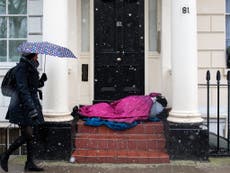
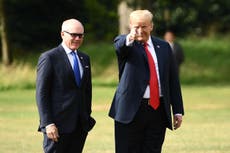
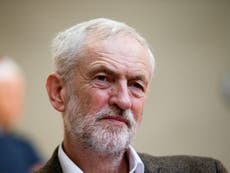
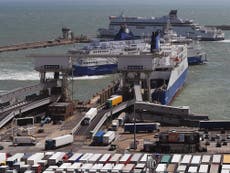
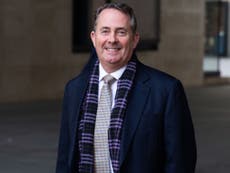
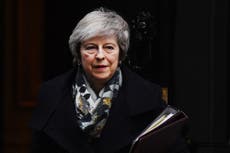
Join our commenting forum
Join thought-provoking conversations, follow other Independent readers and see their replies